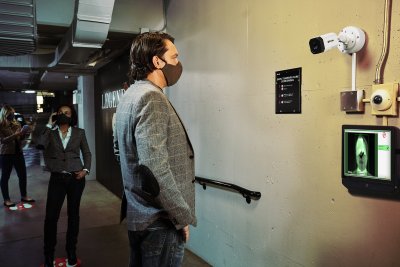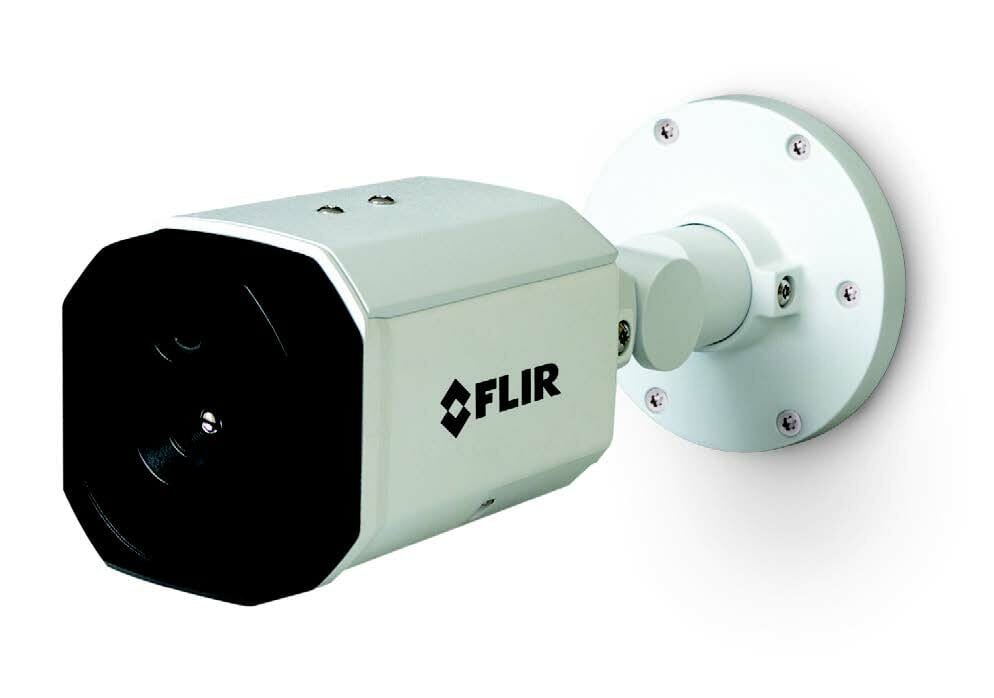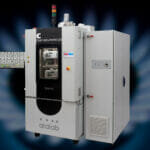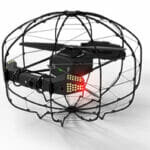Features an Automatic On-Edge Guide to the Inner-Canthus for Improved Temperature Reading Accuracy and People Flow Through Screening Checkpoints
As employees continue returning to the office, travelers start flying again, fans slowly return to stadiums, technology that focuses on maintaining health and safety in semi-public and private venues remains crucial to slowing the spread of COVID-19.
In response, FLIR Systems today announced the FLIR Elara™ FR-345-EST, a fixed-mount radiometric thermal security camera that measures elevated skin temperature (EST) accurately without contact or the need for a reference temperature source. This system provides a safe and effective environment at high-traffic airports, stadiums, commercial buildings, and manufacturing facilities to quickly asses skin temperature at access control points. The Elara FR-345-EST automatically guides to the part of the body that most closely correlates to core body temperature: the inner-canthus—or the inner eye of a human face—without sacrificing accuracy or the ability to maintain social distancing guidelines.
The Elara FR-345-EST camera can serve as a stand-alone system without the need for desktop software or as part of a broader access control program designed to improve people flow for elevated skin temperature screening while simultaneously improving the accuracy of finding the inner-canthus, balancing the needs of personal safety and convenience. It also integrates with a variety of third-party video management systems (VMS), including FLIR United VMS, to enable fast integration within the existing security infrastructure to avoid adding risk to network IT security.

Improved Speed and Accuracy
Through the use of integrated algorithms and a convolutional neural network (CNN), as individuals pass through the screening process the interactive on-screen prompts assist with eyewear identification, proper pose, positioning, and head orientation. This enables the camera’s on-edge artificial intelligence to automatically locate and measure the temperature at the inner canthus within an accuracy of +/- 0.5° C (+/- 0.9° F).
The improved AI capabilities with the on-camera software also improves the screening assessment time to an average of one-second-per-individual after the subject is in a stationary position in front of the camera and once eyewear has been removed, helping to keep lines of workers, spectators, guests, students and patients moving and to eliminate any potential crowding at checkpoints*. The self-screening operation provides instant go/no-go feedback and the adaptive alarm threshold feature can be used to minimize false alarms to account for natural body temperature fluctuations throughout the day.
The Elara FR-345-EST reduces setup time and calibration while improving real-time operator decision-making with on-edge analytics. Now the user has the ability to simply self-start by connecting the camera to a smart monitor with a web browser to view a live user interface. While the camera removes the need for a dedicated operator specific to EST frontline screening**, integrators, customers and their staff can still expect a seamless user experience.
The camera can also be customized to meet specific integrator or customer needs. In addition, FLIR offers extended training and support for customers and users to properly setup, operate and maintain the system.
The Elara FR-345-EST is available globally starting today through authorized dealers, with shipments expected to begin in Q4. To learn more please visit www.flir.com/fr-345-est.
*For the most accurate temperature readings, FLIR EST cameras detect heat and do not require any saving personally identifiable information during the screening process.
**FLIR EST screening solutions should be considered as one component of a broader health and safety screening program. FLIR EST cameras are not medical devices and a second screening by a medical profession is always recommended.





